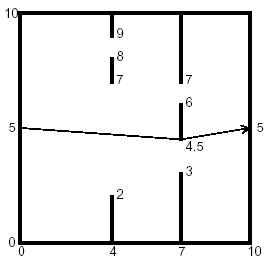Description
You are to find the length of the shortest path through a chamber containing obstructing walls. The chamber will always have sides at x = 0, x = 10, y = 0, and y = 10. The initial and final points of the path are always (0, 5) and (10, 5). There will also be from 0 to 18 vertical walls inside the chamber, each with two doorways. The figure below illustrates such a chamber and also shows the path of minimal length.


Input
The input data for the illustrated chamber would appear as follows.
2
4 2 7 8 9
7 3 4.5 6 7
The first line contains the number of interior walls. Then there is a line for each such wall, containing five real numbers. The first number is the x coordinate of the wall (0 < x < 10), and the remaining four are the y coordinates of the ends of the doorways in that wall. The x coordinates of the walls are in increasing order, and within each line the y coordinates are in increasing order. The input file will contain at least one such set of data. The end of the data comes when the number of walls is -1.
2
4 2 7 8 9
7 3 4.5 6 7
The first line contains the number of interior walls. Then there is a line for each such wall, containing five real numbers. The first number is the x coordinate of the wall (0 < x < 10), and the remaining four are the y coordinates of the ends of the doorways in that wall. The x coordinates of the walls are in increasing order, and within each line the y coordinates are in increasing order. The input file will contain at least one such set of data. The end of the data comes when the number of walls is -1.
Output
The output should contain one line of output for each chamber. The line should contain the minimal path length rounded to two decimal places past the decimal point, and always showing the two decimal places past the decimal point. The line should contain no blanks.
Sample Input
1 5 4 6 7 8 2 4 2 7 8 9 7 3 4.5 6 7 -1
Sample Output
10.00 10.06
这题超级恶心,用计算几何建边 ,然后建图。
建立边的过程有点繁琐,主要是N 小
暴力建立边
主要是考虑是否会有线段相交,判断一下是否相交就好了,
通过计算几何的线段是否相交公式建边
因为这个是一排一排的
int l = (i - 1) / 4, r = (j - 1) / 4;
所以这个 l 是 i 所处的排数 r 是 j 所在的排数
点数很少 所以任意的最短路都可以跑
最后就是注意一下输出 %f
1 #include <cstdio> 2 #include <cstring> 3 #include <algorithm> 4 #include <cmath> 5 using namespace std; 6 const double INF = 1e8; 7 const double eps = 1e-8; 8 const int maxn = 1e3 + 10; 9 double d[maxn][maxn]; 10 struct point { 11 double x, y; 12 point() {} 13 point(double x, double y): x(x), y(y) {}; 14 point operator - (const point & a) const { 15 return point(x - a.x, y - a.y); 16 } 17 double operator * (const point & a) const { 18 return x * a.x + y * a.y; 19 } 20 } p[maxn]; 21 double dist(point a, point b) { 22 return sqrt((a - b) * (a - b)); 23 } 24 double cross(point a, point b) { 25 return a.x * b.y - b.x * a.y; 26 } 27 int judge(point p1, point p2, point q1, point q2) { 28 double cros1 = cross(q1 - p1, q2 - p1); 29 double cros2 = cross(q1 - p2, q2 - p2); 30 if (fabs(cros1) < eps || fabs(cros2) < eps) return 1; 31 return cros1 * cros2 < 0 ? 1 : 0 ; 32 } 33 34 int main() { 35 int n; 36 while(scanf("%d", &n) && n != -1) { 37 p[0] = point(0, 5); 38 double x, y1, y2, y3, y4; 39 for (int i = 0 ; i < n ; i++) { 40 scanf("%lf%lf%lf%lf%lf", &x, &y1, &y2, &y3, &y4); 41 p[i * 4 + 1] = point(x, y1); 42 p[i * 4 + 2] = point(x, y2); 43 p[i * 4 + 3] = point(x, y3); 44 p[i * 4 + 4] = point(x, y4); 45 } 46 p[n * 4 + 1] = point(10, 5); 47 memset(d, 0, sizeof(d)); 48 for (int i = 0 ; i <= 4 * n + 1 ; i++) { 49 for (int j = i + 1 ; j <= 4 * n + 1 ; j++) { 50 int l = (i - 1) / 4, r = (j - 1) / 4; 51 if (i == 0) l = -1; 52 int flag = 1; 53 for (int k = l + 1 ; k < r ; k++) { 54 if (judge(p[4 * k + 1], point(p[4 * k + 1].x, 0), p[i], p[j])) { 55 flag = 0; 56 break; 57 } 58 if (judge(p[4 * k + 2], p[4 * k + 3], p[i], p[j])) { 59 flag = 0; 60 break; 61 } 62 if (judge(p[4 * k + 4], point(p[4 * k + 4].x, 10), p[i], p[j])) { 63 flag = 0; 64 break; 65 } 66 } 67 d[i][j] = d[j][i] = (flag ? dist(p[i], p[j]) : INF) ; 68 } 69 } 70 for (int k = 0 ; k <= 4 * n + 1 ; k++) 71 for (int i = 0 ; i <= 4 * n + 1 ; i++) 72 for (int j = 0 ; j <= 4 * n + 1 ; j++) 73 d[i][j] = min(d[i][j], d[i][k] + d[k][j]); 74 printf("%.2f\n", d[0][4 * n + 1]); 75 } 76 return 0; 77 }